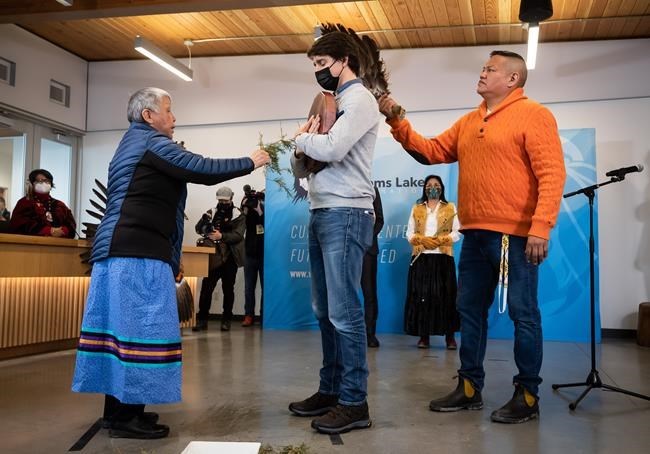WILLIAMS LAKE, B.C. — A moment of silence for the children who didn't return home from the St. Joseph's Mission Residential School near Williams Lake, B.C., marked the end of a visit Wednesday by Prime Minister Justin Trudeau.
Trudeau walked around the site of the former institution, which has been demolished, and helped Williams Lake First Nation Chief Willie Sellars light a fire where people offered prayers and tobacco.
The prime minister and Crown-Indigenous Relations Minister Marc Miller spent the day visiting the nation in central B.C., starting with a welcome from children drumming and ending with the ceremony where St. Joseph's once stood.
The nation announced in January that a preliminary investigation had found 93 "reflections" that could indicate the unmarked burial sites of children at the site.
Trudeau said he was moved by the courage of survivors as they shared painful experiences to help their communities heal and understand what happened at the institution that opened in 1891 and closed 90 years later.
"Many of them spent years, not talking, not thinking, about that incredibly difficult time in their life, when they were students at that so-called school," he said.
Trudeau told the survivors and members of the nation that he was there to listen and learn from them about what the path forward looks like, "not just for this community, but for this country, in partnership, in respect, in reconciliation."
Miller said he knows the process of finding and documenting unmarked graves at former institutions can be emotionally draining for Indigenous communities.
"It is retraumatizing. There's a lot of scars getting reopened."
The minister added that he hoped to have an update for the public in May or June about what's happening with such investigations across the country.
RoseAnne Archibald, the national chief of the Assembly of First Nations, was also at the gathering and said more than 130 former institutions across Canada have yet to be searched for the possible graves of children.
She said the journey toward healing is long and painful, but she felt "blessed" to see Trudeau and Miller listen to survivors as they became emotional.
"To watch that interaction was such an honour for me because (the survivors) were sharing so much of themselves," Archibald said.
"I know (that) interaction with Prime Minister Trudeau is an important one. It's an important one because I believe that when you touch somebody's heart, you help them to understand the importance of healing."
Trudeau announced Wednesday that Ottawa will provide $2.9 million in additional funding for First Nations in B.C. to support healing for communities whose children were taken from their families and sent to St. Joseph's.
A statement from the Prime Minister's Office says the funding will be used to continue the investigation at St. Joseph's and to "further uncover the truth about what happened at the school and begin the process of healing."
The St. Joseph's institution was opened by the church as an industrial school where Indigenous children were required to do labour like timber splitting and farming.
Sellars thanked Trudeau for taking part in their ceremonies and starting his visit in a powerful way.
"We are a proud people, we are proud First Nations, and today I am a proud Canadian," he said.
Sellars said there's still work to be done to hasten the healing process for Indigenous Peoples in Canada, but Trudeau's visit was a "great first step."
Trudeau said he visited the nation to show that all of Canada grieves with the community "at the feelings of loss that have come since the discovery of the reflections, but also the deep loss that this community has felt over generations because of the legacy of residential schools."
The final report of the Truth and Reconciliation Commission, which documented the experiences of survivors and others affected by Canada's residential schools, says at least 4,100 children died of neglect at the institutions.
Trudeau told media his government is committed to sharing all the information that can be possibly found about the institutions "to allow for healing, to allow for closure and to allow for us to move forward with full understanding of what the terrible truth of our history is."
In a news release ahead of the prime minister's visit, the Tsilhqot'in National Government said St. Joseph's was the main residential institution for six Tsilhqot'in communities in the surrounding area, and every Tsilhqot'in family is affected by "this legacy of trauma."
It said the Tsilhqot'in chiefs are calling for a greater role in the ongoing investigation.
The Indian Residential Schools Resolution Health Support Program has a hotline to help residential school survivors and their relatives suffering with trauma invoked by the recall of past abuse. The number is 1-866-925-4419.
This report by The Canadian Press was first published March 30, 2022.
Brenna Owen, The Canadian Press



